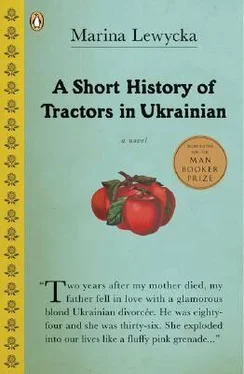Later, when Kishka came looking for her, she handed over the cigarettes. He was delighted. Army cigarettes had a much higher tobacco content than the rubbish doled out to the labourers.
If Vera had taken only one or two cigarettes, perhaps the whole story would have been different. But the guard, of course, noticed that the packet was missing. He stalked through the yard with his cat-whip, picking on the kids one at a time. Lack of a smoke was making him irritable. Who had seen the thief? Someone must know. If they didn’t own up, the whole block would be punished. Parents too. No one would be spared. He muttered about the existence of a correction block, from which few emerged alive. The children had heard the rumours too, and they were terrified.
It was Kishka himself who fingered Vera.
“Please sir,” he grovelled, cringing as the guard pinched his ear, “it was her-that skinny one over there-she nicked them and gave them out to all the kids.”
He pointed out little Vera, who was sitting silently near the door of one of the huts.
“You, was it?”
The guard grabbed little Vera by the collar of her dress. She didn’t have the presence of mind to deny it. She started to cry. He hauled her inside to the guardroom, and locked the door.
Mother went in search of Vera as soon as she got back from the factory and found she was missing. Someone told her where to look.
“Your daughter is a thieving little rat,” said the guard. “She must be taught a lesson.”
“No,” Mother implored in her broken German, “she didn’t know what she was doing. The big ones put her up to it. What does she want with cigarettes? Can’t you see what a stupid little thing she is?”
“Stupid, yes, but I need my cigarettes,” said the guard. He was a big man, slow in his speech, younger than Mother. “You’ll have to give me yours.”
“I’m sorry, I have none. I traded them. You see, I don’t smoke. Next week, when we are paid, you can have them all.”
“What use is next week? Next week you will have another story.” The guard started to flick his whip around their legs. His face and ears had gone bright red. “You Ukrainians are ungrateful swine. We save you from the communists. We bring you to our country, we feed you, we give you work. And all you can think of is to thieve from us. Well, you have to be taught a lesson, don’t you? We have a correction block for vermin like you. You have heard about F Block? You have heard how nicely we look after you there? Soon you will know.”
Everyone had heard rumours about the Correction Block, a row of forty-eight cramped windowless concrete cells half buried underground, like upright coffins, which stood on its own at one side of the Labour Re-education Camp. In winter, cold and rain added to the torment; in summer, dehydration. Some had seen people dragged out crazed and skeletal after ten or twenty or thirty days. Longer than that, it was said, no one was dragged out alive.
“No,” pleaded Mother. “Have pity!”
She seized Vera and pulled her into her skirt. They cowered against the wall. The guard drew closer, closer, pushing his face up to theirs. His chin gleamed with thin downy blond stubble. He must have been in his early twenties.
“You seem such a nice young man,” Mother begged, choking on the unfamiliar German words. Tears were in her eyes. “Please, show us some pity, young man.”
“Yes, we will show pity. We will not separate you from your child.” They could feel the spray from his crooked-tooth mouth as he gabbled, excited by his power. “You will go with her, vermin mother.”
“Why must you do this? Don’t you have a sister? Don’t you have a mother?”
“Why are you talking about my mother? My mother is a good German woman.” He paused for a moment, blinked, but the momentum of his excitement was too strong, or his imagination failed him.
“We will teach you to raise children not to steal. You will be re-educated. And your vermin husband, if you have one. You all will be corrected.”
The darkness breathes all around us. Then I hear a muffled mousy sniffy sort of sound from the bunk below. I lie quite still trying to fathom what it is, for it is a sound I have never heard before, a sound I have refused to hear, a sound I never imagined was possible. It is the sound of Big Sis crying.
One day I will ask Vera about the Correction Block, but now is not the time. Or maybe my sister is right: maybe there are some things that are better not known, for the knowledge of them can never be un-known. Mother and Father never told me about the Correction Block, and I grew up with no knowledge of the darkness that lurks at the bottom of the human soul.
How did they live the rest of their lives with that terrible secret locked away in their hearts? How did they grow vegetables, and mend motor-bikes, and send us to school and worry about our exam results?
But they did.
Twenty-Seven. A source of cheap labour
“Pappa, please try to be sensible,” says Big Sis, slamming the milk-jug down on the table. “You cannot be the father of the baby. Why do you think she ran off when I suggested a paternity test?”
“Vera, you have always been a nose-poking autocrat,” says Father, drenching his Shredded Wheat with the creamy top of the milk and burying it under a heap of sugar. “Leave me alone. Now go back to London. Please go!” His hands are shaking, but he still tries to stuff his mouth, then he starts to cough and projectiles of Shredded Wheat fly across the table.
“Please try to act like an adult for once in your life. What has happened to your brains? You’re not the father of the baby, you’re a baby yourself. Look at the way you behave-you’ve become completely infantile!”
“An Infantile Disorder! Ha ha ha!” He bangs his spoon on the table. “Vera, you become more like Lenin every day.”
“A paternity test is a good idea,” I intervene slyly, “because then you will know not only whether you are the father of the baby, but whether it is a boy or a girl.”
“Aha.” He stops in mid-cough. “Good idea. Boy or girl. Good idea.”
Vera throws me an appreciative glance.
Stanislav and Dubov are in the front garden, engaging in father-son bonding under the open bonnet of the Rolls-Royce. Mike is still asleep in the front room, but he has fallen off the settee on to the floor. Vera, Father and I are having breakfast in the back room, which is now both the dining-room and his bedroom. Slanted sunlight is streaming in through the dusty windows. Father is still wearing his nightshirt, a strange self-made garment constructed out of an old check Viyella shirt which he has extended in length with some pieces of a paisley winceyette fabric, stitched on to the flaps in large loops of black button-thread, and held together in front with brown shoelaces. It is opened at the neck, and his long-since-healed wound, bristling with silver hairs, winks at us as he talks.
“But…” he looks warily from me to Vera to me again, “…paternity test is only possible after birth of baby. Then it is plain whether is boy or girl without any test.”
“No, no. It is possible to have a paternity test before the baby is born. In utero .” Vera catches my eye. “Nadia and I will pay.”
“Hmm.” He still looks suspicious, as though he thinks we are trying to trick him. (As if we would!)
At that moment, the letter-box rattles. The morning post has arrived. Among the pile of invitations to open credit card accounts, amazing offers on health and beauty products, and promises of fabulous prizes to be won or already won and waiting to be claimed (Pappa: “How lucky she is to win such prizes!”), all addressed to Valentina, is a letter to my father from Ms Carter. She reminds him that the divorce hearing is to be in two weeks’ time, and puts forward an offer from Valentina’s solicitor not to contest the divorce, nor to make any further claim upon my father’s property, were a payment of £20,000 to be offered in full and final settlement.
Читать дальше












